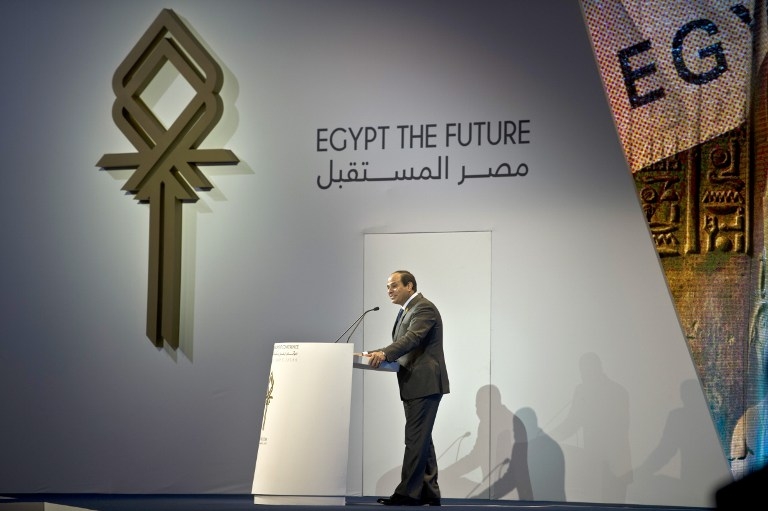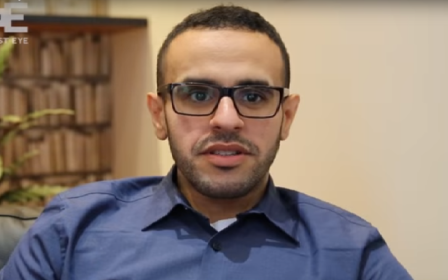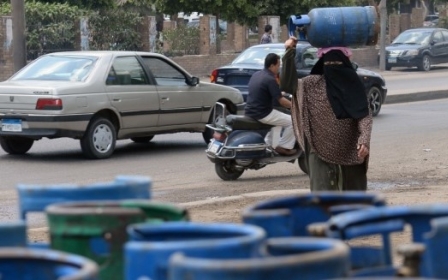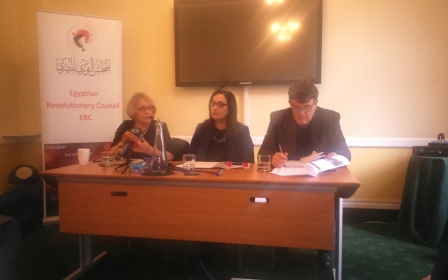With Sisi visit come business deals - and doubts over who benefits

Along with a tea with MPs, a meeting with Prime Minister David Cameron at Downing Street and a banquet, the Egyptian president and a business delegation accompanying him to London this week will be pitching their country as a place for British companies to invest.
Several deals are expected to be signed during the short visit, including two focused on security and higher education, according to a statement sent on Tuesday. But Egyptian-British business leaders have been quiet on the specifics.
"I've got wind of a couple of things," said Robin Lamb, executive director of the Egyptian-British Business Council earlier this week, "but it's not for me to talk about them."
With the promise of agreements and contracts comes the more difficult context of the relationship between the economy and stability in a volatile country and region - and questions of the role trade can and should play.
Human rights advocates have said they are concerned that trade relations with Egypt and what the government calls its "prosperity agenda" have taken priority over raising concerns about violations in the country under Sisi which have been described by Human Rights Watch as the worst human rights crisis in a generation.
"We are not against trade and investment," said David Mepham, UK director for Human Rights Watch, "but it's very, very important that the British government should be using all of its influence, economic, diplomatic and trade, to try to promote reform and respect for human rights and respect for international law."
Business advocates say that British trade and investment can improve the quality of life for Egyptians - for example providing jobs when unemployment among those under 25, who make up half the population, is 35 percent - and can benefit both countries at the same time.
"We haven't got all of these British companies in Egypt just to sell things to Sisi personally," Lamb said. "It's a population of 90 million people. That's 90 million people who need jobs ... they need to be able to develop their economy so they can be better off, and we believe by cooperating with high-quality British companies that it can help them develop."
Who benefits?
But given the Egyptian military's reported control over massive infrastructure projects and historical grip on the state economy, some question whether the benefits of trade actually trickle down to most Egyptians.
"Trade would be fine if free and fair," said Sameh Shafi, a coordinator of the UK-based grassroots movement, Stop Sisi, "but actually 'trade' is a cover for what in reality is top-heavy private contracts infested with bribes and kickbacks that benefit none but the already rich, most of whom are military or in the pockets of [the military] while the poor of Egypt drown deeper in a pit of poverty and misery."
And given the US diplomatic turnaround that has seen its $1.3 annual military aid reinstated to Egypt in April, despite failed diplomatic attempts since July 2013 to intervene against Sisi, there are questions about how much of a tool trade is for UK diplomats to apply pressure.
"As the largest foreign direct investor in Egypt, there are certainly levers that Britain could decide to use if it wished. If you were truly cynical it could also act as a refuge for many of Sisi’s opponents as well," said Chris Doyle, director of the Council for Arab British Understanding. "The question is whether there any desire to use this leverage."
Any diplomatic leveraging between countries - or persuasiveness as he calls it - flows from personal relationships, said Sir Dominic Asquith, the UK's ambassador to Egypt between 2007 and 2011. That's why, he said, Sisi's visit this week is critical to ensure that both governments understand each other's objectives and end goals, however difficult to swallow. Business, he suggested, may be seen as a bridge between the two.
"There are few occasions when one government can compel another to do what it doesn't want to do," Asquith said. "Relationships are built on a common understanding of shared values and objectives . . . so it is important, as a step in that process, that Sisi and British political leaders build a relationship which allows them to talk frankly to each other and be listened to, rather than to talk past each other."
"Few businesses will invest in a country about which they have serious concerns. That is the reality. It helps if there is engagement at the top level which creates a framework for discussion and reassurance. So it’s really helpful that President Sisi is coming," he added. "That said, the reality also is that he may come across points of view expressed by various sectors of British society which may be difficult for him, but he'll need to recognise that's the context in which he is operating."
Egypt's largest investor
Sisi’s trip to London is the latest in his stops to capitals around the world in what some have suggested is a bid to solidify his legitimacy as a leader on a world stage after the July 2013 coup.
The government’s invitation to Sisi has elicited criticism from politicians and civil society leaders and fuelled the founding of a campaign, called Stop Sisi, which points to human rights violations in the country, including an estimated 40,000 Egyptians who have been imprisoned, often in overcrowded and unsanitary conditions, since the coup.
Many opposed to the visit ask one question: why would the UK welcome Sisi? In addition to concerns over security in the Middle East, particularly in Libya, one reason may very well be business.
Unlike the other capitals Sisi has visited, London is the hub of Egypt’s largest non-Arab investor. The attraction of British capital to Egypt is a mix of factors, namely its large population and therefore large consumer base that reportedly increases by 1 million each year, an educated and skilled, yet cheap, workforce, and its location both along the Suez Canal and near Europe.
Last year, the UK was the largest foreign investor in Egypt, investing more than $5bn which made up nearly 50 percent of total foreign direct investment in the country, according to figures from the Central Bank of Egypt and UK Foreign Office. More recently, UAE investment in Egypt is thought to have surpassed that of the UK.
In March, 75 British companies were invited to the "Egypt the Future" conference, held in Sharm el-Sheikh and largely seen as Sisi's chance to woo much-needed financial investment - at least $300bn by his estimates - for the country's economy.
"British companies are not just making profits, but are creating jobs, energy supplies and infrastructure to drive Egypt’s future," said UK ambassador to Egypt John Casson at the time. "And we are not just about signing business deals but about supporting long-term reforms that are needed for Egypt to succeed: cutting bureaucracy, removing obstacles to foreign investment, and ensuring that economic growth benefits the poorest and most vulnerable in society."
During the conference, British energy giant BP signed an agreement with Egypt to invest $12bn into the West Nile Delta project, expected to eventually source 25 percent of Egypt's current gas production and create 5,000 local jobs. Cited as the largest ever British investment in Egypt, the agreement, as MEE investigated, was the latest deal in a project that had been ongoing for 20 years, but had yet to produce gas. Sources told MEE that Egypt would lose $32bn as BP and its partner gained increasingly better terms.
UK companies operating in Egypt, including BP, BG Group, Vodafone, Barclays, HSBC and Unilever, have invested more than $25bn since 1992, according to Taher El Sherif, secretary-general of the Egyptian-British Chamber of Commerce.
Not small beans
While large corporations often make the headlines, small and medium-sized British investors make up at least 40 percent of total investment in Egypt, El Sherif said.
Trade between the two countries ebbs and flows each year, but remains fairly balanced and substantial for both. Last year, around $1.7bn worth of British goods – with largest exports including machinery, iron and steel, and electronics - and a little over $1bn worth of Egyptian goods were traded, according to International Trade Centre figures.
Even some of London's iconic red double-decker buses are now made in Egypt; and fava beans, used to make foul madames, a classic soup served in Egyptian restaurants and kitchens, are grown in East Anglia and shipped to Egyptian ports.
But there have been challenges for those investing in Egypt in recent years including bureaucracy, foreign currency shortfalls which hold up the repatriation of profits, and energy shortages, especially in factories.
Just ahead of the Sharm el-Sheikh conference, Sisi approved a new investment law – described as a "one-stop-shop" – to reduce red tape, including a process which apparently saw investors obtain 78 permits to start a company, and build confidence in the country.
The Egyptian-British Chamber of Commerce's El Sherif acknowledges that, in one of the oldest bureaucracies in the world as he describes Egypt, project and work permits can still be slow going, even after the passage of the new law, and suggested that small and medium-sized investors find Egyptian partners.
"If they go in on their own and invest in Egypt, this is not a good idea," El Sherif said. "They have to have a strong, honest, faithful partner in Egypt."
"But the business environment is more conducive now than two years ago, more than four years ago," he added. "It's more relaxing and it's easier, especially for small and medium-sized business."
Lamb said some of the challenge is even getting British businesses to consider exporting to Egypt - or exporting at all.
"We have to get over the hump that when you think of Egypt, you think of Pyramids," he said.
During Sisi’s visit, several business-focused events will be held, including a meeting on Thursday that will bring representatives from medium-sized Egyptian and British companies together to spark potential partnerships.
"It's nitty gritty stuff," said Lamb of the various meetings in the works, "but that is what businesses should be about."
Back seat to business?
For human rights advocates, the nitty gritty include concerns that British politicians in direct contact with Egyptian officials have prioritised UK trade and business with Egypt over pressing Sisi on the country's human rights record since he came into power.
"We are concerned that the British government appears to be fairly weak in how it is approaching Egypt," said Mepham, HRW's UK director.
Shafi, with the Stop Sisi campaign, said he is against UK official and military personnel "standing with Egyptian generals and ignoring all human rights abuses".
"It's disgusting and against everything we stand for as British citizens," he said. "That kind of trade doesn't let the country prosper, nor does it help the poor and needy. It just feeds this repressive regime and gives them the power to further crush any dissent."
On 3 March, days ahead of the Sharm el-Sheikh conference, Middle East minister Tobias Ellwood acknowledged to the UK parliament's foreign affairs committee that during a British trade delegation to Cairo in January, concerns about human rights had not been raised.
"Our focus was on the commercial aspects," he said, adding there was "a time and a place" to raise specific issues.
More recently, in a meeting of the same committee on 9 September, when asked whether trade and industry had been prioritised over human rights, Foreign Secretary Philip Hammond's top secretary, Sir Simon McDonald, said: "I would dispute that it is low down, but I would not dispute that right now the prosperity agenda is further up the list."
There are also questions around £40mn worth of UK military vehicle components that were licensed for export to Egypt in March 2015. On 9 October, MP Caroline Lucas asked what specifically had been licensed for export.
Secretary of State for Business, Innovation and Skills Anna Soubry responded, saying that the license was for "chassis for manufacture of vehicles for use in counter-insurgency and counter-terrorism operations in Sinai".
Since July 2013, as the Egyptian government has struggled with militancy in the Sinai Peninsula and stepped up its campaign to target violent groups, more than 3,000 buildings have been destroyed along the border with Gaza, leaving thousands without homes.
Although it is difficult to obtain information from Sinai, reports have indicated that hundreds of civilians, among at least 3,600 in total, including militants, have died as a result of the state's counter-insurgency operations.
"I think there are big questions that they need to answer about that," Mepham said of the export licenses. "[The UK government] claim that that’s entirely consistent with their code of conduct and arms exports which prohibits weapons from being used for internal repression or external aggression, but can they spell out how they have done that assessment and what that means?"
Business as diplomacy?
For other investments, Mepham said British companies investing in Egypt "should do so in a way that is fully consistent with international human rights standards and international human rights law and the British government should be setting out clearly how that is happening and the precautions and steps that they are taking to make sure that is happening."
The Egyptian-British Business Council's Lamb would seem to agree: "It is not the business of companies to try and outthink the international community and governments on what is appropriate when the business is to develop everybody, not just a group or a particular group."
For Asquith, who served as ambassador in the years leading up to Egypt's 2011 revolution, there is a sense of urgency.
"A government has to respond to the aspirations of its young people through its political and economic policies. That was a problem faced by the Mubarak government - hence the revolution. It appeared to approach the question as a theoretical problem, or as one you could deal with by buying off people, buying their acquiescence. In 2010 and 2011, it was becoming increasingly clear that you can't buy off that sort of frustration on the street... People have to get a lot more serious about recognising that these aren't theoretical problems, but are real and affect us all.
"I think we should be focusing much more closely on how we can help governments to improve their economies," Asquith added. "This may be, at this stage in the post-Arab revolution process, a more effective way of trying to deal indirectly with another problem which is how do you stop people getting so fed up and frustrated that they become security problems."
Middle East Eye propose une couverture et une analyse indépendantes et incomparables du Moyen-Orient, de l’Afrique du Nord et d’autres régions du monde. Pour en savoir plus sur la reprise de ce contenu et les frais qui s’appliquent, veuillez remplir ce formulaire [en anglais]. Pour en savoir plus sur MEE, cliquez ici [en anglais].




